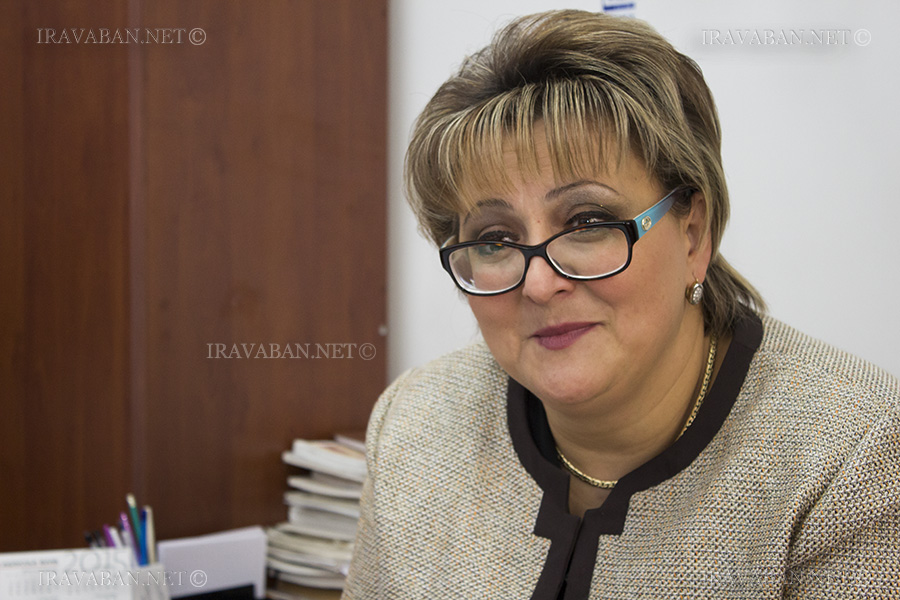Ms Nune Manuchatyan, the notary public of Abovyan City of Kotayk Marz of the RA worked almost equally in Gavar region of Gegharkunik marz as well. Notary says that there was a significant difference between the awareness of the residents of two regions; we talked to Ms Manucharyan about different issues, beginning from her work activities and finished with the issues on the improvement of the notary system.
What seemed really funny to the notary public during her work in Gavar marz, which in the soviet years was known as Kamo region. With what problems did the people often apply to the notary and why did the notary’s work become more and more difficult? Details in our interview
In the period of 1983 – 1988 you were a student at the Law Department of YSU. In the interviews with other notaries they told me that in the soviet days one did not chose the work on own initiative. They were immediately after the graduation sent to work from university. Was it the same in your case?
Yes. Just after the graduation I was assigned to work in Kamo region. In 1989 I was accepted to work in the Notary Public’s Office of Kamo, in today’s “Kyavar”, as the people say. I worked here for 13 years. In 2003, I moved to Kotayk Notary district on the order of the Minister of Justice.
Are you not sorry that you gained just this job?”
Absolutely, I love my profession, firstly I love my people. Also this job is the sense of my life. Helping the people, I’m feeling good.
What difference can be noted between the two notary offices?
People in Kamo region are more traditional people, while there are various people in Abovyan. They come from different areas; from Baku, Kirovabad, and Karabakh. They are various personalities. People in Gavar the same traditions and customs as people living in the same area.
By the way, I often had opportunity to talk to the citizens in Gavar. In fact, there is a deep-rooted stereotypical thinking. Moreover, it also damages women’s rights. Have you fixed such problems?
Of course, when working in the early years of this region, I asked the men to bring their spouses to the notary office to obtain their agreement for the transactions. They were very very surprised, saying why they should bring the woman to give her consent. Later they get used to that condition.
You said people in Kotayk region were of different types. What is their level of legal consciousness?
In my opinion, the people of this region have higher legal consciousness. People are more educated and aware of their rights. We are working to fill other gaps. In this respect, we significantly increased people’s consciousness. For example, there was a problem with inheritance. If in the past the people were coming to arrange the legacy six months after the death, we had to ask them to apply to the court in order to recover term. But no, thanks to our activities, people are aware that they have to apply to the notary office within six months after the death of their relative and open the inheritance case. And then after the expiry of the six months they could apply when they want to finish the inheritance case.
If we look at the statistics, what are the problems that the clients basically apply to the notary office?
Due to the economic deterioration the applications associated with increased borrowing agreements stakes in banks or between individuals. For the same reason, the number of disputes between heirs has increased. We work much to prevent disputes among the heirs. We are trying to avoid court disputes. Notary’s work is also in the prevention of disputes, which we successfully do.
Very often there are complaints from local notaries that this work does not ensure their existence. There are few customers. How is it in your case?
Probably the most remote regions have such problem. Transactions among the people are more in our region and the people are able to pay for notaries.
The notary must also be a psychologist. I often hear such claims. Do you agree and what problems you are having at work?
Yes, not only a good specialist, but also a psychologist, able to listen the citizens and feel their state of mind. We try to do everything within the framework of law, and the position that he is happy when he leaves. We try to work so that at least they are satisfied in this difficult life
What does the electronic notary system give you?
We receive information from the passport department, the Road Police. We are connected with the state cadastre and State Revenue Committee. We are able to send and receive online reports. The system facilitates our work. Of course there are shortcomings, but they will be eliminated in future. Such experience exists in CIS countries. I was recently on a business trip to Kazakhstan, there are many such networks in this country. For example, they have networks of had Disabled, creditors and the dead. There are different supporting networks in other countries. The new system is being introduced in our country as well and I hope in the future we will have the support networks, through which we shall provide support to people.
Are there future lawyers in your family?
No, I would not want my children to be a lawyer. They have chosen other professions. We all are demanding to ourselves, and we first of all tried to teach this to our children as well. I believe we have succeeded in this
Interview: Gevorg Tosunyan
Photos: Aleksander Sargsyan
Author of the idea: Karen Zadoyan















